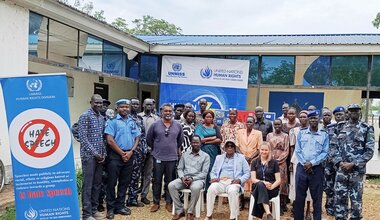Malakal’s trailblazing military women tell stories of trials and triumphs as the UN celebrates women in peacekeeping
“Are you ready to die in a foreign country?”
This was the question posed to Lieutenant Colonel Catherine Gadayan by the president of her country, the Philippines, during her exit call. It shook her. Till this point, she had not imagined that she might actually perish during her first tour of duty for a United Nations peacekeeping mission.
Since she is here, in Malakal in northern South Sudan, to tell us about her experience, Lieutenant Colonel Gadayan obviously dared the leap, and survived it.
“My most touching moment so far was during my induction, when I learned of how little the men here valued women,” she says. “Finding out how women here are often treated inhumanely, how they often miss out on education and are violated and segregated in different ways… It was heartbreaking.”
Yet she and other peacekeepers in the country have been fortunate, as South Sudan has enjoyed a couple of relatively peaceful years, and she has made history in the process.
Catherine is the sole Filipino military officer serving with the United Nations Mission in South Sudan this year, and the first ever to be based in Malakal. Together with other female peacekeepers, this writer included, she has been defying the odds, thriving in this unforgiving environment, so different from her faraway Southeast Asian home country.
She is stationed in Malakal’s integrated operations hub, where all the different cogs that keep a field office running form a wheel. This is where representatives from all the uniformed and civilian components sit down to coordinate activities and produce a seemingly never-ending stream of situation reports. These documents make sure that everyone who needs to know is well informed, and can make decisions accordingly.
It is hard to believe that this soft-spoken, introverted peacekeeper is an engineer who has maintained the aircrafts of three of her country’s presidents. Just how did she end up here?
“My boss, who has been on two peacekeeping tours himself, encouraged me to take the military observer course – which was really tough, by the way!”
Catherine did well. In fact, so well that she was added to a roster of qualified female military observers. Last year she received her call for peacekeeping services.
That was the easy part. Telling her mother that she was leaving for South Sudan… Well, that was a hard sell.
“We are very close, so I had to promise to call every day!” she says. “I was just happy to get the opportunity to serve my country as part of a peacekeeping mission where I could make a difference, alongside many other strong women.”
One of these women is Wing Commander Solyce Owusuwaa Pepprah, who on arrival in South Sudan was warned that Malakal was one of the tougher field offices.
A native of Ghana, Solyce already had African experience under her wings. She was confident that she was ready and able to handle whatever situation she might end up in. As is often the case, however, the reality on the ground has sometimes sown seeds of doubt.
“I remember when I was tasked to manage operations. I wasn’t sure I would make it,” she says. “This is a complex region given that some parts are still under the control of opposition forces. It takes a generous dose of patience and tact to cut through the layers, understand what is really going on and to make oneself understood.”
The Wing Commander’s personnel administration experience was a far cry from the intricacies of operations management. Solyce spends her days coordinating patrols throughout the Upper Nile region, host to countless towns, four UNMISS bases operated by three military contingents, and three of the country’s major ethnic groups.
Her duties involve spending countless hours talking to military commanders and local authorities across the divide to make sure mission patrols can proceed as envisaged. There are many moving parts, a myriad of personalities, cultural differences, multiple ways of doing things, just to get to one destination.
Then there is the patriarchy, an obstacle she now knows how to deal with.
“I’ve learned that there is no limit to what a woman can do. No man can intimidate me, no matter how tall they are,” she says, well aware of her own limited stature compared to most South Sudanese men. “I keep this in mind every day I go to work.”
Professionals like Lieutenant Colonel Gadayan and Wing Commander Pepprah are the reason the United Nations is celebrating Women in Peacekeeping on this year’s International Day of UN Peacekeepers on 29May.
 UN
UN United Nations Peacekeeping
United Nations Peacekeeping





